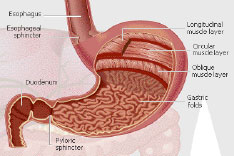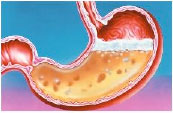Gastroesophageal Reflux Disease, Hiatal Hernia And Heartburn

Gastroesophageal reflux disease (GERD) is a digestive disorder that affects the lower esophageal sphincter. (LES)—the muscle connecting the esophagus with the stomach.
In normal digestion, the LES opens to allow food to pass into the stomach and closes to prevent food and acidic stomach juices from flowing back into the esophagus. Gastroesophageal reflux occurs when the LES is weak or relaxes inappropriately allowing the stomach’s contents to flow up into the stomach’s contents to flow up into the esophagus. Figure 1 and Figure 2 show the location of the LES between the esophagus and the stomach.
The severity of Gerd depends on LES dysfunction as well as the type and amount of fluid brought up from the stomach and the neutralizing effect of saliva.
The Role of Hiatal Hernia
Hiatal hernia occurs when the upper part of the stomach moves up into the chest through a small opening in the diaphragm (diaphragmatic hiatus). The diaphragm is the muscle separating the stomach from the chest. Recent studies show that the opening in the diaphragm acts as an additional sphincter around the lower end of the esophagus.
Studies also show that hiatal hernia results in retention of acid and other contents above this opening. These substances can reflux easily into the esophagus.
Coughing, vomiting, straining, or sudden physical exertion can cause increased pressure in the abdomen resulting in hiatal hernia. Obesity and pregnancy also contribute to this condition. Hiatal hernia usually does not require treatment.
Other Factors Contribute to GERD

Dietary and lifestyle choices may contribute to GERD. Certain foods and beverages, including chocolate, peppermint, fried or fatty foods, coffee, or alcoholic beverages, may weaken the LES causing reflux and heartburn. Studies show that cigarette smoking relaxes the LES. Obesity and pregnancy can also cause GERD.
Heartburn
Heartburn, also called acid indigestion, is the most common symptom of GERD and usually feels like a burning chest pain beginning behind the breastbone and moving upward to the neck and throat. Many people say it feels like food is coming back into the mouth leaving an acid or bitter taste.
The burning, pressure, or pain of heartburn can last as long as 2 hours and is often worse after eating. Lying down or bending over can also result in heartburn. Many people obtain relief by standing upright or by taking an antacid that clears acid out of the esophagus.
Heartburn pain can be mistaken for the pain associated with heart disease or a heart attack, but there are differences. Exercise may aggravate pain resulting from heart disease, and rest may relieve the pain. Heartburn pain is less likely to be associated with physical activity.
Avoiding foods and beverage that can weaken the LES is recommended. These foods include chocolate, peppermint, fatty foods, coffee, and alcoholic beverages. Foods and beverages that can irritate a damaged esophageal lining, such as citrus fruits and juices, tomato products, and pepper, should be avoided.
Decreasing the size portions at mealtime may also help control symptoms. Eating meals at least 2 to 3 hours before bedtime may lessen reflux by allowing the acid I the stomach to decrease and the stomach to empty partially. In addition, being overweight often worsens symptoms. Many overweight people find relief when they lose weight.
Cigarette smoking weakens the LES. Therefore, stopping smoking is important to reduce GERD symptoms.
Elevating the head of the bed on 6-inch blocks or sleeping on a specially designed wedge reduces heartburn by allowing gravity o minimize reflux of stomach contents into the esophagus.
Antacids taken regularly can neutralize acid in the esophagus and stomach and stop heartburn. Many people find that nonprescription antacids provide temporary or partial relief. Long-term use of antacids, however, can result in side effects.
For chronic reflux and heartburn, the doctor may prescribe medications to reduce acid in the stomach. These medicines include H2 blockers, which inhibit acid secretion in the stomach. Currently, four H2 blockers are available: cimetidine, famotidine, nizatidine, and ranitidine. Another type of drug, the proton pump (or acid pump) inhibitor omeprazole inhibits an enzyme (a protein in the acid-producing cells of the stomach) necessary for acid secretion. The acid pump inhibitor lansoprazole is currently under investigation as a new treatment for GERD.
Other approaches to therapy will increase the strength of the LES and quicken emptying of stomach contents with motility drugs that act on the upper gastrointestinal (GI) tract. These drugs include cisapride, bethanechol, and metoclopramide.


